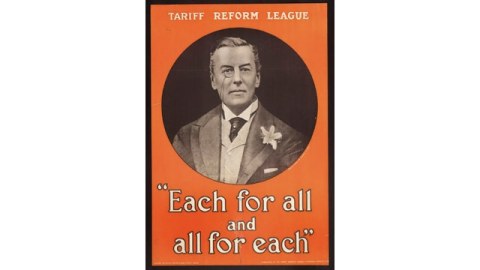A Non-Stupid Case for Economic Nationalism

Orthodox globalization declares that any hindrance to rational market efficiency is a Bad Thing. So there’s no sensible counter to that unnamed Apple executive in the New York Times‘ series on outsourcing and working conditions who said “we don’t have an obligation to solve America’s problems. Our only obligation is making the best product possible.” Those of us who find this kind of an ugly thought can find it hard to justify our repugnance. After all, protectionism is supposed to be bad for everyone. And perhaps there’s also a moral argument against depriving poor citizens of other nations of their chance to rise. But this post by Clyde Prestowitz points to a different, more convincing way to defend economic nationalism. He notes that corporations turn out to be very selective about when they denounce this irrational preference for one country over others. Companies are only free-trade rationalists when it suits them; the rest of the time, they’re us-first nationalists.
Prestowitz is a former trade negotiator in the Reagan administration, so he can speak authoritatively, out of his own experience, about this corporate hypocrisy. In his post over at Foreign Policy, he notes that when he was in government, “Steve Jobs and other Apple executives had the funny notion that the U.S. government had an obligation to help them and asked me and other negotiators at the Commerce Department and the Office of the U.S. Trade Representative to help them get on the shelf in Japan. We did all we could and in doing so came to learn that virtually everything Apple had for sale, from the memory chips to the cute pointer mouse, had had its origins in some program wholly or partially supported by U.S. government money.”
Nor, he says, does Apple act as if it is on its own when it comes to protecting its intellectual property. It benefits from having the U.S. government on its side there—as it does from having the U.S. military guaranteeing the security of its long global supply lines. Asian governments, of course, are famously even more active in helping their industries than is ours. And that’s the fundamental reason they can offer Apple and other multinationals such attractive deals. “It’s not because these countries have better technology or more engineers or cheaper wages,” Pretowitz writes, “it’s because they targeted, subsidized (through currency manipulation, tax preferences, and other means), protected, and even invested state money in these industries […].”
As Alexander Cockburn noticed (his post led me to Prestowitz), in these observations is the outline of a justification for economic nationalism that non-Luddites can accept. When a company depends on the irrational tug of nationalism to win government help, the rest is just reciprocity: If your company takes help from the rest of us on Tuesday on the grounds that we’re all Americans, then it can’t tell us on Thursday to skip the sentiment, we’re all just global consumers.





